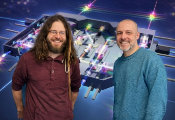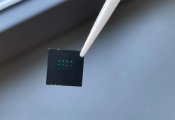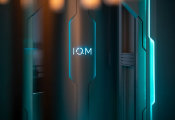Yonsei University Launches S. Korea’s 1st 127-Qubit Quantum Computer
November 05, 2024 -- Yonsei University has established South Korea’s first quantum computing hub, featuring an IBM quantum computer that boasts a remarkable performance of 127 qubits. Housed within a three-meter glass cube and cooled to near absolute zero (−273°C), the cutting-edge quantum processor is IBM’s most powerful machine installed outside the United States. Currently in trial operation, the Quantum Computing Center will officially open on Nov. 20, when the computer will begin full operations. “This marks a milestone for South Korea as a quantum computing hub,” said Cheong Jae-ho, head of the university’s quantum business division. “We will focus on collaboration with industry to foster talent in quantum technology,” he added.
Yonsei University is introducing a quantum computer that exceeds 100 qubits for the first time in South Korea, a crucial threshold for meaningful research applications. Until now, the country has only had access to experimental quantum computers with a maximum performance of 20 qubits. The arrival of this high-performance quantum computer is expected to usher in a new era in quantum computing in Korea, allowing researchers to utilize advanced technology more swiftly and conveniently.
Quantum computing is seen as a game-changing technology expected to surpass even the best supercomputers. Google’s 53-qubit quantum computer completed calculations in 200 seconds that would take a supercomputer 10,000 years. This has generated excitement in the scientific community about Yonsei University’s recent acquisition of South Korea’s first 127-qubit quantum computer. Quantum computers are particularly powerful in areas like cryptography, where they can perform large-scale parallel computations. Some experts suggest that problems solvable by classical computers in over 100 million years could be tackled in just a minute with a quantum computer. However, as these claims have yet to be proven through practical demonstrations, further research is needed to achieve commercialization.
Yonsei plans to focus its quantum research on biotech applications. “Quantum computing can help predict drug structures and dramatically reduce the time to identify promising new drugs,” Cheong noted. Industry experts believe quantum computing could cut the usual 10 to 15 years required for new drug development by more than half.
Near the quantum computing center, a quantum research complex is under construction to oversee the integration of IBM’s quantum technology and facilitate industry-academia collaborations. When combined, the quantum computing center and the research complex will cover an area of 8,500 square meters. Yonsei University plans to provide workspace for companies to utilize quantum computing, supporting joint projects between corporate and academic researchers. “Companies will present the challenges they wish to solve, and researchers will collaborate with them to design solutions using quantum computing,” said Cheong. Located in Songdo, which hosts major biotech firms like Samsung Biologics and Celltrion, the center is expected to create synergies within South Korea’s biotechnology sector.
Domestic researchers will also gain faster access to quantum resources. Due to a lack of locally available commercial-level quantum computers, most South Korean institutions have relied on cloud-based services from foreign providers, often paying high fees and facing delays of two to three days. “Many major firms have been paying high fees to access U.S.-based quantum clouds,” Cheong said. With Yonsei’s quantum computer dedicated to domestic users, these wait times are expected to be reduced sharply.




































